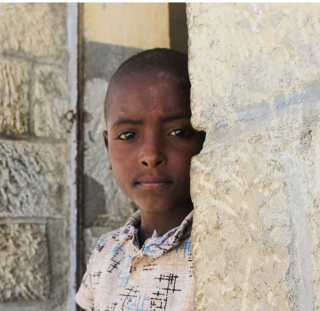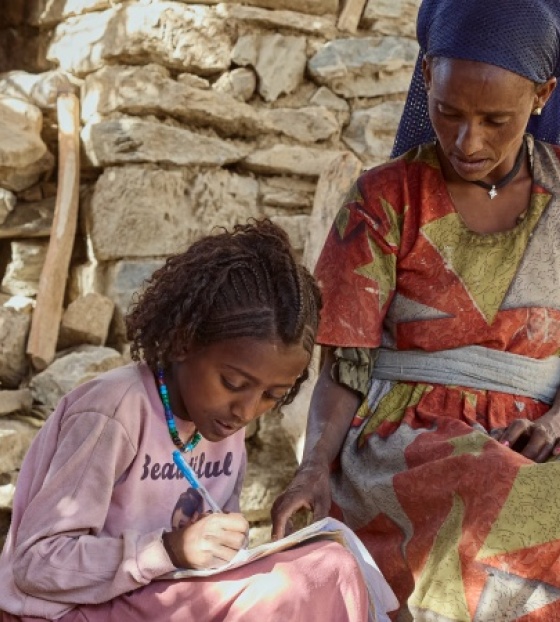
“This is not just me, this is not only my village, it is all over Tigray.”
Fitsum could only send one of her children to school, so she chose her daughter, Aradech. In a region on the brink of famine, the arrival of school feeding at her school would be a lifeline not only for the bright young student but also for her siblings.
As you approach Ara Primary School, clouds of dust rise up from the fields in front of you. There’s not a drop of moisture in the soil; the result of a devastating drought here that is threatening to claim so many lives.
People living in this part of Tigray have endured unimaginable horror in the past few years. A brutal yet largely unreported war claimed the lives of an estimated 600,000 people and left many more with physical and psychological wounds and a complete loss of their livelihoods.
The damage to agriculture – a source of survival for so many – was catastrophic. Fields of crops were burned, oxen used for ploughing were slaughtered, and machinery was looted or destroyed.
As peace has tentatively returned to this part of Ethiopia, it’s been met by drought. And with it, hopes that things might just return to normal, have gone. It’s not an exaggeration to say that people are starving here. This perfect storm of devastating events has left people in desperate hunger. Even more worrying, it’s seems widely agreed that if some serious aid doesn’t come here soon, it could be even worse than the famine of the 80s, where a million people lost their lives.
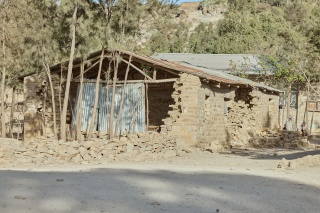
The Hintalo District has long been classed as a vulnerable hot spot area for drought, but that isn’t the first thing that strikes you as you drive into the area. You cannot fail to notice the great mountain ranges that lie at the far end of the flat brown and red plains that stretch out in front of you. The surrounding scenery is spectacular, but that’s not what’s on the minds of the people who live here.
Ara Primary School was shelled during the war, and the older students are still learning in the classroom that sustained most of the damage. Located in the centre of the school yard and enthusiastically built by the local community for its children, this classroom once stood proudly as a beacon of hope.
The school used to run two shifts a day – with some pupils in the morning, and others in the afternoon. But the enrolment numbers reduced so much during the war that they now only have enough students for a single session in the morning.
Amidst this talk of catastrophe, devastation and loss on such a scale, are the individual children whose lives have been so brutally torn apart by what is happening here. They each have their own unique experience of extreme hunger, and what it means for them.
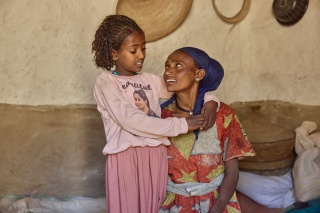
An 11-year-old girl called Aradech is one of these children. Her father died during the war, leaving her mother, Aradech Fitsum, to provide for Aradech and her siblings. Aside from farming, Fitsum used to weave baskets to sell in the market, but with everyone in Tigray struggling, she asks: “who is going to buy from me now?”
In a school full of vulnerable children, Aradech’s teacher describes her situation as ‘horrific’:
“The family don’t have anything to eat, no-one to support them, so her and her family’s life is very horrible and frustrating.”
Fitsum tries to give her children pieces of bread when she can, but says they are never satisfied. She is worried all the time and feels afraid for the future. In just a few years, this previously happy family has seen life change dramatically:
“Before the conflict, I was doing farming. When it stopped [because of the war] people were helping me but now everybody is in problem, so people can’t help me. After my husband died, the kids couldn’t help me to plough, to farm. They can’t help me economically because they are kids, so they are staying at home simply because of the problems I have.
“We were harvesting wheat, barley, and other grains. But after the war we couldn’t harvest. We are living with hunger, we only have this piece of bread or some soup, we don’t satisfy ourselves, we are surviving just with this.
“The problem now is the shortage of rain, consecutively, for three years. Even the rich are in problem now because of the drought. This repeated seasonal problem, [it is causing] great hunger, and even death.
“This is not just me, this is not only my village, it is all over Tigray. In my life, I have never seen such a problem before.”
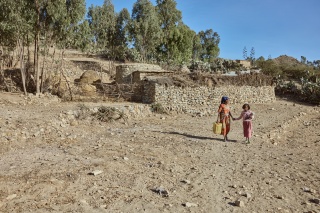
With four children to provide for and not enough money to pay for food and school materials for them all, like so many other parents in her community, Fitsum had to accept that she could no longer afford for all of her children to go to school. She was faced with a choice – which of her children should she send? She chose Aradech.
However, with hunger sapping Aradech of all her energy and ability to concentrate, her education is suffering now too.
“She used to perform well in school but now she sleeps in class and if she’s asked why she is sleeping, she says it’s because she can’t tolerate the hunger, because she doesn’t have enough to eat. Her performance is decreasing very significantly.” her teacher told us.
“Before Aradech was alert and active, but now she has become shy and lethargic. She used to come to school and play with her classmates, but now she stays isolated from other students.”
This is the reality facing so many children across Tigray. At Ara Primary School alone, as many as 300 children who used to attend don’t come here anymore, including three of Fitsum’s own children.
“Without a school feeding programme, only those who can afford can continue [with school], otherwise those who can’t afford it, like me, will go back to their home.”
There isn’t currently a school feeding programme at Ara Primary School, but Aradech and her mother are clear what it would mean for their family if there were.
“I would have food all the time,” says Aradech, “and all the school materials and then I would be able to support myself later on. I would have all that I need.” “If no help comes [there will be a] famine” adds Fitsum, “but with a feeding programme, the children can eat. They will benefit directly. They will think about school, they will be fit and run if they eat, they will come out of stress, they will learn properly. It will be good if they get food and we ourselves will be happy, because they will be happy, so this benefit would be for all of us.”
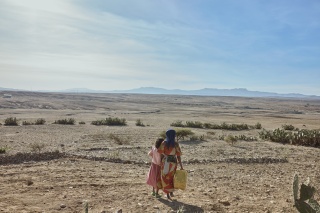
It is perhaps this glimmer of hope that sustains them, through all the hardships they have faced. And a feeling that might be spreading in the community too. In the few hours that Mary’s Meals representatives spent at Ara Primary School, 15 students came to register for school. One can only imagine what that number would be if the Mary’s Meals school feeding programme actually started.
The immediate priority for these parents it to quell their children’s pangs of hunger but they are brave enough to dare look beyond that too:
“My hope is that if they learn, their life will not be like mine.” says Fitsum, “I want to see them have a better life than me.”
